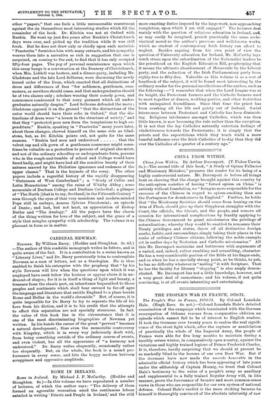Rome in Ireland. By Michael J. F. McCarthy. (Hodder and
Stoughton. 6s.)—In this volume we have reproduced a number of lectures, of which the author says : "The delivery of them formed an agreeable recreation amid the continuous labour entailed in writing Priests and People in Ireland,' and the still
more exacting duties imposed by the large work, now approaching completion, upon which I am still engaged." The lectures deal mainly with the question of religious education in Ireland, and, as may easily be imagined, preach practically the same eccle- siastical moral as the author's previous and well-known works, which no student of contemporary Irish history can afford to neglect. Besides arguing from his own point of view the question of University education for Ireland, Mr. McCarthy lays much stress upon the subordination of the Nationalist leaders to the priesthood on the English Education Bill, prophesying that it means the ultimate abandonment of Home-rule by the Liberal party, and the reduction of the Irish Parliamentary party from eighty-two to fifty-five. Valuable as this volume is as a sort of handbook of the subject, it will be found most interesting by the ordinary reader for the personal recollections of the author, such as the following :—" I remember that when the Land League was at its height, the Protestant farmers and the Catholic farmers used to meet together at dances, wedding-parties, and other festivities with unimpaired friendliness. Since that time the priest has been crushing all the life and gaiety out of Ireland. Social intercourse between Protestant and Catholic has been diminish- ing. Religious intolerance amongst Catholics, which was then little known, is now becoming the rule rather than the exception. It is not that the lay Catholics naturally entertain feelings of vindictiveness towards the Protestants ; it is simply that the priests and the superstitions which they teach wield a more baneful influence over the Irish Catholics of to-day than they did over the Catholics of a quarter of a century ago."






















































 Previous page
Previous page